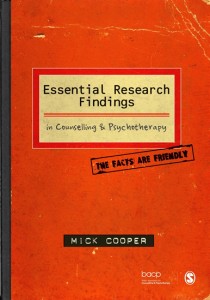 The perception that therapists and their techniques play the most significant role in influencing the outcome of treatment is challenged in a new research review, launched today at the Annual Conference of the British Association for Counselling & Psychotherapy in Telford.
The perception that therapists and their techniques play the most significant role in influencing the outcome of treatment is challenged in a new research review, launched today at the Annual Conference of the British Association for Counselling & Psychotherapy in Telford.
The book, Essential Research Findings in Counselling and Psychotherapy: The Facts are Friendly, written by Professor Mick Cooper of the University of Strathclyde, concludes that the most important factor in successful therapy is a client, or patient, who is motivated and engaged and who is able to use therapy to build on his or her strengths.
Professor Cooper also finds that a strong relationship between therapist and client is one of the best indicators of a positive therapeutic outcome, and is far more significant than a therapist’s particular techniques and approach.
The review is published at a time when the government has recently committed £173 million a year to be spent on Cognitive Behavioural Therapy (CBT) as part of its Improving Access to Psychological Therapies programme.
Professor Cooper, of Strathclyde’s Faculty of Education, said: “Many clients will benefit from CBT but there is a danger in putting too much emphasis on the type of therapy that a therapist provides, rather than the therapist’s ability to relate to his or her client in caring and understanding ways, and the needs and preferences of individual clients.
“Rather than moving towards a therapeutic ‘monoculture’, we need to be able to provide people with a range of therapies and therapists, so that they can choose the one that best suits them and build on their particular strengths.”
This finding is supported by the work of eminent American psychologist Barry Duncan and colleagues. They wrote in 2004 that “clients, not therapists, make therapy work.”
The book, which is the first reader-friendly summary of research findings in the field, also offers advice to people who are considering seeing a therapist, on their choice of practitioner and the best type of therapy available to them.
Professor Cooper said: “Think about choosing a therapist who can help you build on your strengths – for instance, if you are good at understanding why you do the things you do, a therapist who can help you develop these reflective skills may be more use to you than a therapist who wants to focus mainly on your behaviour or emotions.
“Ask potential therapists what thoughts they might have on why you are facing the difficulties you are and what they think might help. If these are radically different from your own understandings, it may be more difficult to establish a good working relationship.
“Ask yourself whether you like your therapist and feel respected by them – the quality of your relationship, early on in therapy, will be one of the best indicators of eventual outcomes, so don’t put up with a bad relationship. Remember that probably the best predictor of the outcomes of therapy will be the extent to which you actively involve yourself in the process.
Source: Alpha Galileo, Essential Research Findings in Counselling and Psychotherapy: The Facts are Friendly is published by SAGE, in association with the British Association of Counselling & Psychotherapy and is available in paperback and hardcover from http://www.sagepub.co.uk/booksProdDesc.nav?prodId=Book232252&
